Representing full-time Taxi Drivers Nationwide
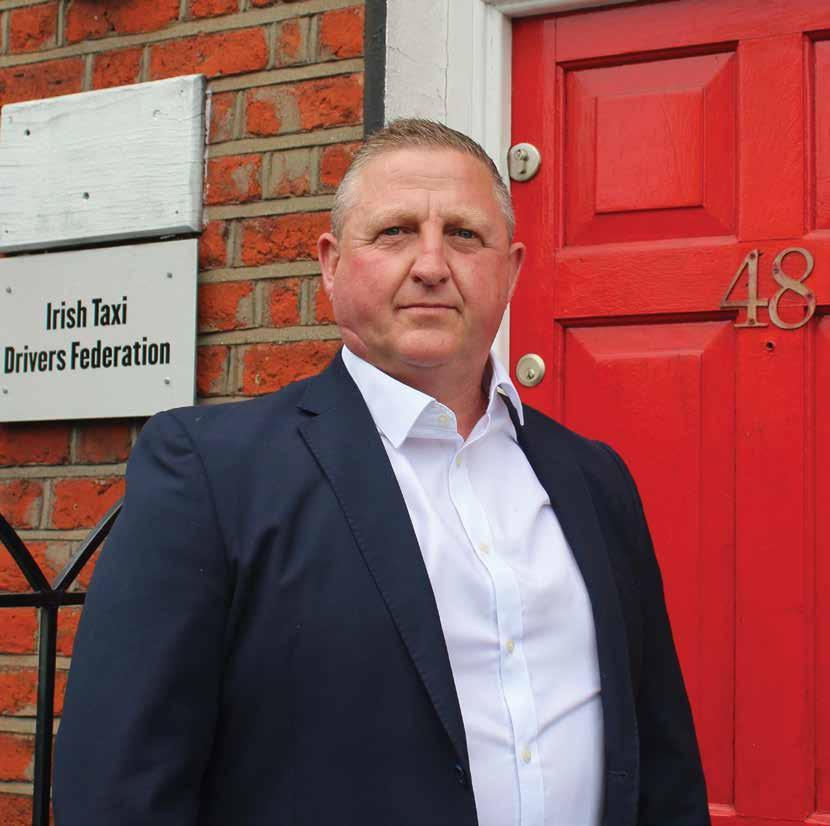
A PROUD HISTORY
IRISH TAXI DRIVERS’ FEDERATION (I.T.D.F) TURNS 50
CALLS TO REFORM WAV GRANT SCHEME
TAXI GRANT ALLOCATION SNAPPED UP IN MINUTES
I.T.D.F. PRESIDENT, ALAN COOLEY, DISCUSSES THE BIG ISSUES






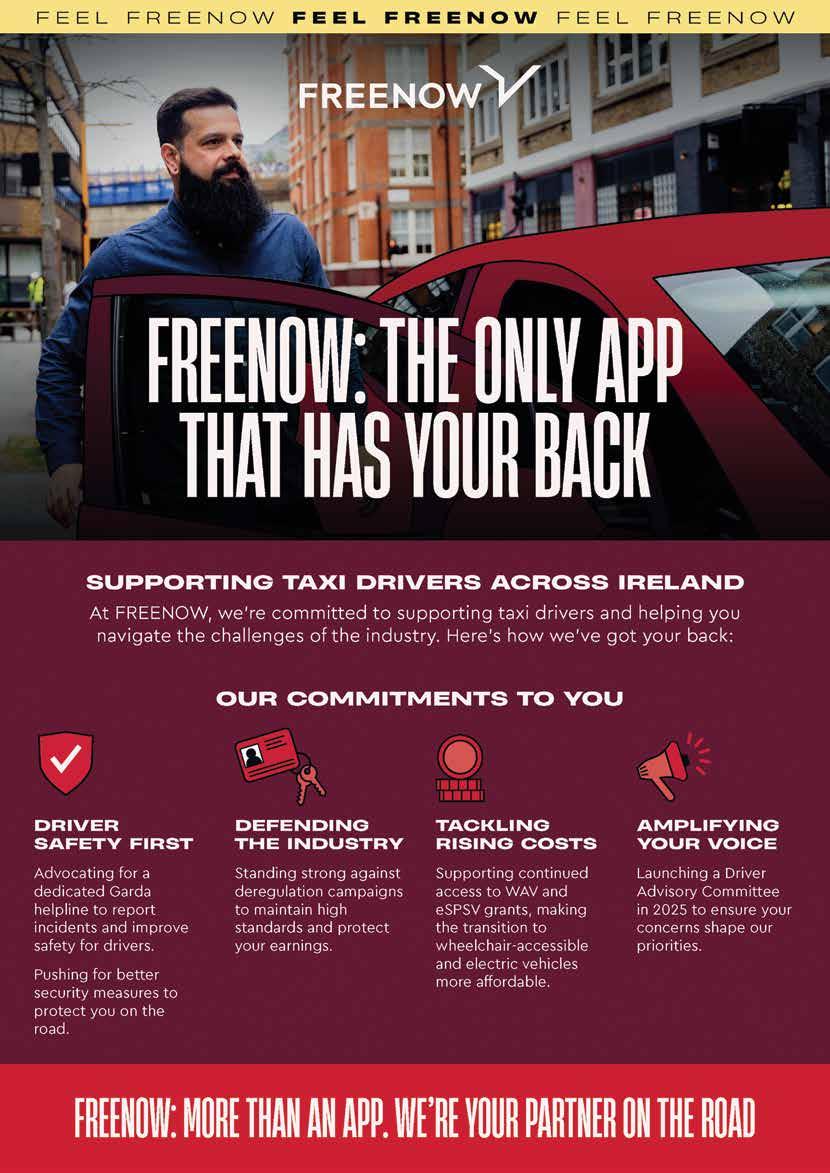

Representing full-time Taxi Drivers Nationwide

IRISH TAXI DRIVERS’ FEDERATION (I.T.D.F) TURNS 50
CALLS TO REFORM WAV GRANT SCHEME
TAXI GRANT ALLOCATION SNAPPED UP IN MINUTES
I.T.D.F. PRESIDENT, ALAN COOLEY, DISCUSSES THE BIG ISSUES







5 Taxi World News and updates from the Irish Taxi Drivers’ Federation and Ireland’s taxi industry.
7 Calls to Reform WAV Grant Scheme
With applications closing just 15 minutes after opening on January 6 due to being heavily oversubscribed, the opening round of the 2025 Wheelchair Accessible Vehicle (WAV) Grant Scheme has once again shone a spotlight on the challenges and constraints facing Ireland’s taxi industry and its efforts to improve accessibility.
11 Leading the Charge for an Improved Taxi Industry
Danny O’Gorman, the newly appointed General Manager of FREENOW Ireland, outlines his bold vision for transforming Ireland’s taxi sector - and reaffirms his commitment to empowering drivers at every turn.
12 Safeguarding the Taxi Industry’s Future
Alan Cooley, President of the Irish Taxi Drivers’ Federation, warns against the pervasive efforts of global taxi app firms to liberalise the Irish taxi industry and says the professionalism and integrity of the sector must be protected in order to guard against a return to the dark days of deregulation.
19 Keep Moving with RedClick
Taxi Insurance that just clicks: At RedClick, we get it: when your taxi stops, your income does too. That’s why our insurance is built to keep you moving, with comprehensive cover, award-winning claims support, and competitive pricing that simply makes sense.
20 Irish Taxi Drivers’ Federation Turns 50
The Irish Taxi Drivers’ Federation celebrates 50 years as Ireland’s longest-standing taxi representative body and has been advocating for drivers since 1974. Marking this milestone, we reflect on its enduring support and its role in shaping the taxi industry.
25 The Smart Choice for Taxi Drivers
The MG4 EV: Leading the charge in Ireland’s taxi industry.
27 Irish Taxi Drivers Embrace EVs
Ireland’s commitment to reducing carbon emissions and building a greener transport network is accelerating rapidly and the taxi industry is playing its part. The industry’s adoption of electric vehicles is being fuelled by generous incentives and evolving technology that is making electric vehicles (EVs) more accessible and cost-effective than ever.
31 Taxi Fares and Costs
Every two years, the NTA conducts a comprehensive review of taxi fares to ensure they remain aligned with evolving economic conditions. The 2024 Review identified a 9% to 11% increase in operating costs for taxi drivers between 2022 and 2024 and the NT subsequently introduced a significant 9% increase to the National Maximum Taxi Fare on December 1st last year.
The Irish taxi industry has received a temporary reprieve in the form of a one-year extension to the long-standing 10 year rule governing vehicle age limits. From April 1st, 2025, taxi drivers operating vehicles first registered in 2015 have been permitted to continue working for an additional year, up to 2026provided they meet all relevant Public Service Vehicle (PSV) roadworthiness standards.
36
Taxi insurance is essential for legal compliance and peace of mind, protecting drivers, vehicles, and passengers across Ireland’s roads. Here‘s what every professional taxi driver needs to know.
40
myPOS is transforming Ireland’s taxi industry by offering an all-in-one payment solution that simplifies card transactions and boosts cash flow. With features like multi-operator mode, it’s helping taxi drivers meet legal requirements while improving efficiency and reducing hardware costs.
Services
are a dedicated team of professionals with
aim of helping our clients to grow. • Accounting & Audit • Book Keeping & Payroll • Business Advisory & Personal Consultancy • Company Secretarial & Compliance
• Forensic Accounting & Litigation Support
• Liquidations & Corporate Recovery
• Taxation www.brownemurphyhughes.ie 28 Upper Fitzwilliam Street, Dublin 2. Telephone: (01) 661 9142 Fax: (01) 661 9161 E-mail: contact@bromu.ie


Figures from National Transport Authority show that the total number of complaints about taxis fell in 2024 compared with 2023. 54% of the issues raised by users were around payments. That includes the likes of drivers’ refusal to take cashless payments or overcharging.
The second highest category related to accessibility - meaning drivers not taking passengers on short journeys or the refusal to take a passenger in a wheelchair. The total number of complaints has fallen slightly in 2024 compared to the previous year.
According to Lar Kelly, co-founder of Hola Taxi, its a low number of complaints for the total number of journeys: “That’s a very, very low average, in terms of the NTA, I think they’re limited on the resources and maybe then when you look at it, when taxis are not working late at night,” he said.
“Maybe the enforcers don’t want to work at night because of it as well, so we have to take everything into perspective here.”
Uber has recently been the subject of legal action in a number of places, including France, Australia and Belgium, where taxi drivers have claimed that Uber’s activities have resulted in them losing income.
And now more than 10,000 drivers of London’s iconic black cabs are suing the ride hailing giant for £250 million (€291.7 million), alleging that Uber secured its licence allowing it to operate in London through illegal means.
The legal firm Mishcon de Reya, and claims company RGL Management which are handling the claim, say it could potentially see each of the 10,000 plus cab drivers receiving approximately £25,000 in compensation.
The action says that Transport for London (TfL) was misled into giving Uber a private hire operator licence, due to the company not being transparent about its business model.
It is claimed that Uber told TfL that it would be dealing with all bookings, however, in reality, the company regularly delegated bookings to individual drivers, which can have a number of legal consequences due to local transport laws.
The action in London is the latest in a number of similar cases against Uber across the world. In Paris, the company was accused of unfair competition by about 2,500 taxi drivers, but after a Paris commercial court ruling against the drivers, Uber won this lawsuit.
However, in Australia, where Uber was sued by 8,000 taxi drivers there was a different outcome, and it eventually agreed to a $178 million settlement. Uber also lost a court battle in Holland over whether its drivers are permanent employees.
Judges in Amsterdam said the legal relationship between Uber and its drivers has “all the characteristics of
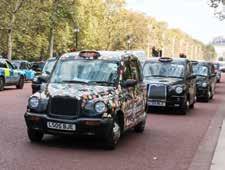
an employment contract,” and drivers working for the ride-hailing app fall under the Dutch taxi drivers’ collective labour agreement. Therefore, Uber drivers in the Netherlands are entitled to the same employment benefits as taxi drivers, a court has ruled.
The Dutch workers’ organisation that brought the case called the decision a major victory for Uber drivers.
“This verdict shows what we have been saying for years,” Zakaria Boufangacha, vice-chair of the Federation of Dutch Unions (FNV) said in a statement. FNV said the ruling means Uber drivers are entitled to more pay and have more rights if they are ill or have their employment terminated.
The court ordered Uber to pay the federation €50,000 in damages for not adhering to the collective labour agreement.
Uber has said that the decision is a blow to the gig economy model and is likely to appeal the verdict. “We are disappointed with this decision because we know that the overwhelming majority of drivers wish to remain independent,” said Maurits Schönfeld, Uber’s General Manager Northern Europe.
“[The drivers] don’t want to give up their freedom to choose if, when, and where to work,” he added.
Meanwhile, in Germany, Uber now operates as only an intermediary company following several legal disputes. German Uber journeys are carried out by car rental companies, where the drivers are mostly permanently employed.

Ireland’s taxi market is forecast to generate revenues of €570m in 2025, according to newly released projections. The data highlights a dynamic landscape for the industry, which faces both opportunities and pressures amid shifting consumer behaviour and the rise of digital ride-hailing platforms.
Despite the solid revenue base, the market is expected to experience a slight annual decline over the coming years, with a compound annual growth rate (CAGR) of -1.09% projected from 2025 to 2029. This would see the total market volume settle at approximately €534m by 2029, indicating a contraction as competition intensifies and user growth plateaus.
The number of taxi users in Ireland is expected to reach 1.49 million by 2029. User penetration is forecast at 29.3% in 2025, decreasing modestly to 27.2% by 2029. While the average revenue per user (ARPU) remains relatively strong at €364.54 the figures reflect a maturing market facing structural change.
One of the primary drivers of this change is the rise of ride-hailing apps such as Uber and Lyft, which have disrupted the traditional taxi industry. These platforms offer consumers greater convenience, transparency, and digital booking capabilities, forcing traditional operators to modernise services and adapt to new expectations.
Globally, Ireland remains a small player in the taxi market. China is projected to dominate in 2025 with revenues of approximately €47.90bn, underscoring the vast scale and growth potential of ride-hailing in larger economies. Nonetheless, Ireland’s market is at a pivotal moment, with digital transformation and consumer trends shaping the future trajectory of urban mobility.
According to taxi app company FREENOW, thousands of drivers may be at risk of losing their SPSV licences due to confusion surrounding VAT requirements when using certain taxi apps. While FREENOW has ensured its drivers are protected from VAT charges, other app operators have left drivers vulnerable to unexpected VAT liabilities.
FREENOW has urged the Government, Revenue, and the National Transport Authority (NTA) to provide clarity and support to affected drivers.
While the provision of passenger transport services in Ireland is VAT exempt, taxi drivers are often required to pay VAT at the standard rate of 23% if they avail of booking facilities via taxi apps. In most cases, taxi app providers have structures in place to ensure VAT payment is not transferred to drivers who accept trips via their respective apps.
FREENOW, for example, is registered for VAT in Ireland, files bi-monthly VAT returns in Ireland, and provides services from Ireland. This approach ensures that its driver partners are not affected by reverse-charge VAT. As a result, FREENOW non-VAT-registered driver partners do not have to register for VAT or file VAT returns. However, if taxi drivers accept trips from an app provider that is not liable
Cowboy hats, engagement rings and a sandwich maker were among the items that Irish people were most likely to leave behind in taxis this year.
Ireland has topped the list as Europe’s most distracted country as passengers in Ireland forgot more than 6,000 items in taxis in the last 12 months, according to one taxi platform.
Mobile phones were the most common items for Irish people to leave behind, accounting for a third of all commonly forgotten items. Bags and wallets or purses came next, with almost 1,200 left in taxis in 2024.
They are followed by nearly 400 keys, 200 glasses, and around 200 headphones. Several engagement and wedding rings were also forgotten in taxis over the past year.
More unusual items found in the back

for VAT payment in Ireland and renders services to Ireland from another country, the VAT requirement then applies to the taxi drivers.
A new EU DAC 7 requirement introduced last year resulted in certain platform operators needing to collect and report on information regarding users of their platform. In line with this new obligation, it emerged that thousands of taxi drivers in Ireland may unknowingly have a history of nonpayment of VAT if they have availed of taxi booking services through a taxi app provider which isn’t registered for VAT payment in this country – consequently, they could now unknowingly be at risk of losing their SPSV licence without the necessary tax clearance certificate.
“Taxi drivers who accept bookings via the FREENOW app do not have to account for VAT on their fares, but this is not the case with all taxi app operators, and this is a real concern for drivers who use multiple apps,” FREENOW said in a statement.
“FREENOW is also calling on the NTA to investigate this matter to ensure that this doesn’t impact the stability of our current taxi supply or put the income of thousands of drivers and their livelihoods at risk if they can’t renew their licences and continue working as a taxi driver.”

seats of taxis included violins, cowboy hats, electric guitars, golf clubs and hair straighteners. There was also a sandwich maker, dentures, spaghetti and a stethoscope. Passengers also left behind merchandise from celebrities who toured Dublin this year, including items from Taylor Swift’s Eras Tour and a Niall Horan T-shirt.
It comes as forgotten items in Ireland accounted for 24% of all items lost in FREENOW taxis across Europe.
Ireland was closely followed by Germany with 18%, Poland with 15%, the UK with 14%, and Spain with 10%, who made up the top five most forgetful countries.
The opening round of the 2025 Wheelchair Accessible Vehicle (WAV) Grant Scheme has once again shone a spotlight on the challenges and constraints facing Ireland’s taxi industry and its efforts to improve accessibility.
Administered by the National Transport Authority (NTA), the scheme is designed to support taxi and hackney drivers in purchasing or converting vehicles to accommodate wheelchair users. However, with applications closing just 15 minutes after opening on January 6, the scheme has sparked criticism, political intervention, and renewed calls for structural reform.
The WAV Grant Scheme was introduced to address a significant gap in transport accessibility for people with disabilities. Since 2010, new vehicle licences for small public service vehicles (SPSVs) have only been available for wheelchair accessible taxis. As a result, 23% of the national fleet is now wheelchair accessible.
To encourage more operators to transition to, or enter the industry with WAVs, the NTA has offered financial incentives. The maximum grant amount was increased from €7,500 to €17,500 in 2023 in response to rising vehicle costs. In 2024, over €6 million was issued under the scheme, and the 2025 fund is expected to surpass that figure.
Despite these increases, the January round of the 2025 scheme saw overwhelming demand, with 2,000 applications submitted in less than 20 minutes, triggering the immediate closure of the online portal.
The high level of interest reflects a broader issue: the cost of purchasing a wheelchair accessible taxi has become prohibitively expensive, with estimates ranging from €60,000 to €90,000. For many drivers, especially those paying hundreds of euros per week to rent vehicles, the grant offers a rare opportunity to gain ownership and reduce long-term costs. Without it, entering or remaining in the industry is financially unfeasible.
The NTA had revised the scheme to provide two application windows in 2025 – January and July – and to increase the time allowed to complete the grant process. However, these changes did little to address the bottleneck created by the ‘first come, first served’ model. Though drivers were notified in advance of the application date, many compared the experience to scrambling for highdemand concert tickets, with technical delays and limited capacity leading to widespread disappointment.
Taxi drivers and industry representatives have reacted with frustration. They have criticised the system for allowing applicants to apply for up to five grants each –reduced from ten in previous years –but still seen as inequitable given the limited funding pool. Drivers called for an overhaul of the process, citing a lack of fairness and transparency.
Danny O’Gorman, General Manager of taxi app FREENOW, likened the grant’s availability to a “sold out gig” and said the demand far exceeds supply. He called for the expansion of the scheme, warning that limited funding undermines efforts to improve transport accessibility for wheelchair users.
Despite the increase in WAVs on Irish roads, many wheelchair users report that their transport needs remain unmet. John Fulham, an advocate with the Irish Wheelchair Association, highlighted persistent issues such as drivers cancelling fares upon seeing a wheelchair or failing to show up altogether. He emphasised that taxis are often the only viable transport option for people with disabilities, given limited public transport alternatives.
Fulham and others stressed that while the grant scheme increases the number of accessible vehicles, it does not ensure service delivery. He called for stronger accountability and behavioural incentives to ensure that drivers respond to accessibility bookings.
The controversy surrounding the January round of the WAV Grant Scheme reached the Oireachtas, where Deputy Niamh Smyth questioned the Minister for Transport, Darragh O’Brien about the fairness
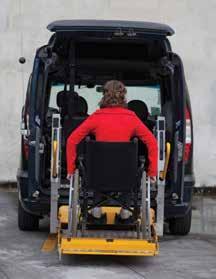
and accessibility of the system. She urged a review of the process to ensure that applicants purchasing WAVs are guaranteed support and proposed widening the grant’s scope to include all taxi types to assist more drivers transitioning from rental to ownership.
In response, Minister O’Brien reiterated that the NTA operates the scheme independently under the Taxi Regulation Acts and confirmed a second round of applications will open in July. He also pointed to the eSPSV Grant Scheme – which provides up to €25,000 for electric SPSVs – as an additional pathway for drivers, particularly those combining both WAV and electric vehicle grants.
While the WAV Grant Scheme has been instrumental in improving the accessibility of Ireland’s taxi fleet, the recent surge in demand has exposed limitations in its design and delivery. With only a small fraction of applicants likely to receive support, and many wheelchair users still struggling to secure reliable transport, stakeholders across the industry are calling for reform. Whether through expanded funding, revised application processes, or improved driver incentives, it is clear that a more strategic and inclusive approach is needed to meet the growing demand and ensure equitable access for all.








































































































































Danny O’Gorman, FREENOW Ireland’s new General Manager, shares his vision for the future of Ireland’s taxi industry and his commitment to supporting drivers every step of the way.
As the new General Manager of FREENOW Ireland, I wanted to take this opportunity to introduce myself to Federation members. I’m delighted to be taking on the task of heading up Ireland’s No. 1 taxi app and am excited to meet and work with as many of you as possible over the coming weeks, months and years. Together, we can drive positive changes that benefit both drivers and passengers.
You will no doubt be aware that there are a growing number of voices, including our competitors Uber and Bolt, calling for the deregulation of the taxi trade to allow for a huge growth in new drivers. At FREENOW, we believe that this focus on deregulating the market would not only damage the passenger experience, but would ultimately serve to decrease demand and impact your earnings. I want to take this opportunity to give you my cast-iron commitment that we do not support the aims of our competitors.
My focus will always be to ensure the needs of our driver
partners and passengers are put first. That is why in the coming months, we will continue to actively call for clear guidance to be issued to drivers on the unresolved VAT liability matter, which has impacted thousands of drivers, as well as action from the government on matters including vehicle age-limits, greater financial support for the transition to electric taxis, and more. I will also be spending time meeting with drivers to ensure your voices are heard every step of the way.
In recent weeks we have also expanded our offer to passengers, improving the experience when booking with FREENOW drivers through initiatives such as the Taxi Booking phone line, FREENOW PLUS, and the Airport Prebook Promise, which ultimately also support drivers to get more jobs via the FREENOW app.
To all drivers, thank you for the work you do and your continued dedication as an integral part of how we move and travel in Ireland. Let’s continue to support one another as we navigate these challenges and build a brighter future for our industry.
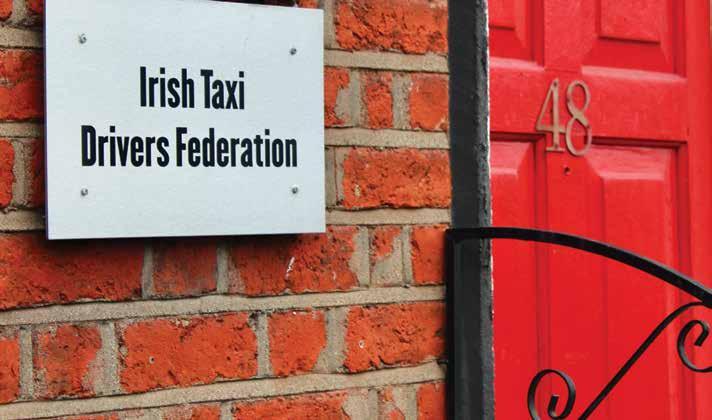
In a wide-ranging interview, Alan Cooley, President of the Irish Taxi Drivers’ Federation, delivers a robust defence of Ireland’s traditional taxi industry, strongly criticising the consequences of past deregulation and warning against the current lobbying efforts by global taxi app firms. His views reflect deep concern for the livelihood of Irish taxi drivers and a commitment to preserving the professionalism and integrity of the sector.
Alan Cooley’s journey to becoming President of the Irish Taxi Drivers' Federation (I.T.D.F.) is rooted in a lifelong affinity for the trade, forged through strong family ties and a steadfast commitment to community service. His background demonstrates the enduring intergenerational legacy of the taxi profession in Dublin. From a young age, he was immersed in taxi culture – his father Gerard, his grandfather, Bill, as well as uncles, brothers and cousins all worked in the industry.
“It was always something that was heavily talked about,” he recalls. “It was always in my mind, and I joined the ranks as soon as I could.”
Beginning his career at Dublin Airport in April 1993, Alan has witnessed profound changes in the sector – from a tightly knit trade centred around familiar city landmarks, to an industry transformed by liberalisation, regulation and digital disruption. His election to the presidency of the IDTF came during the turbulent period of COVID-19, following the death of former President Joe Herron. Amid national lockdowns and uncertainty, Alan decided to step forward.
“We had an executive meeting; I was only 50 at the time, which is relatively young in our industry and because of my knowledge and background, it was felt that I was a strong candidate,” he says. “I was happy where I was to be honest, and I didn’t have any ideas of coming in to take on the position. But I knew the challenges that
lay ahead, I was aware of what was coming down the tracks for the taxi industry and I felt the need to put myself forward to represent Irish taxi drivers.
Alan’s leadership is driven not by ambition for office, but by a deep-rooted desire to serve. Having previously worked for the Federation and volunteered extensively with the GAA; he has always felt a calling toward community contribution. “Serving my community and my fellow co-workers was something I was always going to be interested in,” he says.
Alan’s tenure as President comes at a pivotal time for the taxi industry in Ireland. Since he began driving in the early 1990s, the sector has seen a seismic shift – particularly following deregulation in 2000. Prior to that, there were around 2,600 taxi plates in Dublin. Deregulation opened the market, allowing anyone to obtain a licence, which significantly increased the number of drivers. While it expanded availability, it also introduced challenges related to oversupply and standards.
“Between 2004 and 2009, we had a re-regulation of the industry under the NTA, which introduced higher fees and stricter testing,” Alan explains.
This, he says, marked the beginning of modernisation –including mandatory vehicle inspections and new branding regulations. Yet with the growth of app-based services from 2011




onwards, the structure and culture of the industry have again been destabilised.
“I was invited to come on board to the Taxi Advisory Council, and this really opened my eyes to the fact that our industry was run by people who really had no knowledge of our industry,” Alan says. “People who were making regulations for us, who were not taxi drivers and who weren’t involved in our industry were causing considerable financial problems for drivers.
“So, one of my main goals is to protect our taxi industry and to protect the drivers, and to make sure that we don’t again reach a situation where the industry is heavily oversupplied which causes serious financial hardship to existing drivers. The National Transport Authority have to make sure that they keep an eye on the numbers. We want to avoid creating an industry where it’s a free-for-all and you can just go and buy a licence, a wheelchair licence and get on the road. Sometimes to me it seems to be the standards are not high enough and that means that the quality will suffer.”
One of Alan’s key objectives is to tackle the impact of app-based taxi services. While companies like Hailo (now FREE NOW) initially supported licenced taxi drivers, others like Uber, he warns, seek to liberalise the market further – potentially undermining long-held standards.

Alan describes how drivers who had invested up to €80,000 in their taxi licences saw the value of those assets evaporate overnight. “It was a free-for-all,” he recalls, “with teachers, firemen, soldiers – anyone –suddenly becoming taxi drivers.
One of Alan’s strongest concerns is the multinational ride-hailing companies’ pattern of seeking to undermine the regulated industry through aggressive lobbying. He says the so-called “Taxi Bargain Coalition” – which includes representatives from the hospitality and tourism sectors – is pushing for liberalisation that would destroy the current taxi framework. “These are not people who care about our industry,” he warns. “They are funded and supported by tech companies who want to dominate the market and strip away standards,” Alan says.
This casualisation of the profession, he believes, is deeply damaging. “Taxi driving should be a trained, respected career – not a casual option for someone who just wants to earn a few quid on the weekend. We’re seeing standards drop, and that erodes trust in the industry.”
Alan strongly advocates for improved training and industry pride. He emphasises the importance of local knowledge and driver professionalism, citing overreliance on sat-navs and the lack of basic route knowledge as a growing issue. “You get into a taxi at Dublin Airport going to Rathmines and the sat-nav brings you via the M50. That’s not acceptable. Drivers should know their city.”
He is particularly alarmed at how these taxi app companies use their vast financial muscle to influence policymaking. “Uber spent €80 million lobbying in France – and it went all the way to the President,” he says.
He also warns about the lack of accountability in these platforms, calling them “faceless” and resistant to proper oversight. “Their mission is to dismantle regulated taxi systems across Europe and replace them with part-timers working for a 15% commission and upwards and other hidden charges, which are pushed onto the passenger and the driver.”
“At the moment we’re the Wild West of the app companies with Uber leading the charge. These companies have substantial funds at their disposal, and they spend a lot of money trying to lobby our government and officials to liberalise the taxi licence and ease restrictions on driving a taxi. Basically, their goal is to turn your private car that sits in your driveway into a taxi on a Saturday night,” he says.
“There are so many charges and other things that these app companies get away with that a driver on a taxi rank would be arrested for it. But they’re making up the rules as they go along and in order to suit them because there isn’t proper legislation to keep these guys in check. I would defend the NTA here because it’s very hard for them to move because the legislation is not there to allow them to do so.
“The biggest fight we face is against liberalisation and dropping the standards of our taxi industry. That’s our biggest fight, to make sure that we do have standards and we have quality, and we have proper training programs for new applicants coming into the country and to make sure that the Irish taxi industry is not run from an office somewhere in California.”
“To be fair, to the National Transport Authority (NTA) they realise this, and they promised me on so many different occasions that they have no intention of liberalising the market or making our tests basically unrealistically easy for these people who basically want to be able to download an app over the weekend and become a new driver by the Monday. The NTA assure me that the strong vetting will be maintained.”
Alan is concerned that the ride hailing models could devalue the profession, increase risks to passengers, and lead to further erosion of public trust. He also voices serious concern over the current standards for new entrants to the trade. “The entry process is too loose,” he warns. “You can come in from a European country, do 12 driving lessons, transfer your licence and be driving a taxi within a year. Some of these cars are being fitted with N plates by insurance companies – it’s totally unprofessional and there is also a safety concern.”
To address these issues, Alan proposes a national apprenticeship-style programme overseen by the National Transport Authority (NTA). “Six months isn’t a long time,”
he says. “But in that time, new drivers could learn about driver etiquette, safety standards, and professionalism. You don’t want your children getting into a car with someone who’s just downloaded an app the day before.”
He believes a formalised training pathway, rather than the current piecemeal approach, would elevate quality across the board and rebuild public confidence. “The customer experience is everything. If we get that right, we’re halfway there, we’re not just drivers – we’re ambassadors for our cities and country.”
While Alan sees the NTA as a vital regulatory body that protects the integrity of the industry, he expresses ongoing frustration over a lack of genuine engagement.

“I’m a supporter of the NTA, absolutely. Without them, we’d be swamped by exploitative platforms like Uber, and standards would plummet,” he says. “But the problem is they’re not listening. I’ve made countless suggestions – ideas based on real feedback from drivers – but they go ignored.”
“Taxi driving should be a trained, respected career – not a casual option for someone who just wants to earn a few quid on the weekend. We’re seeing standards drop, and that erodes trust in the industry.”
He believes the industry needs to be more involved in shaping the policies that govern it. “We want to work with the NTA, not against them. But that means proper dialogue, not just lip service. Taxi drivers deserve a seat at the table when decisions are being made about our future.”
While active licence numbers have fallen dramatically –from around 48,000 in 2009 to approximately 27,000 today – Alan warns against lowering standards to fill perceived gaps. He believes part of the narrative around taxi shortages, particularly in Dublin, has been driven by hospitality groups seeking scapegoats for broader economic challenges. “The hotels, restaurants and pubs have priced people out of the city. Yet every December, the blame lands on the taxi industry.”
The Irish Taxi Drivers’ Federation (I.T.D.F.). has long served as a vital support structure for drivers across Ireland and according to Alan, it is more than just a representative body – it is a daily lifeline for many drivers. It offers a wide range of practical services including assistance with income tax, insurance (through a long-standing partnership with AXA), and support in navigating complex social welfare entitlements such as pensions and disability payments.
Alan also pays tribute to Doreen, the office administrator and income tax agent who has worked at the Irish Taxi Drivers’ Federation for some thirty years and provides an invaluable service to members in relation to their annual income tax and other vital administrative requirements, which can be considerable burden for taxi drivers.
“We’re not a business,” Alan stresses. “We’re here to help taxi drivers – many of whom left school at an early age, are older and not tech-savvy and have to deal with the increasingly complicated requirements of operating in today’s regulated environment.”
The Federation also steps in to advocate for drivers facing challenges from official bodies such as the NTA, the Gardaí or the
Revenue Commissioners.
Moreover, the I.T.D.F. plays a critical role in providing guidance on regulatory issues.
And lobbying on some of the key issues. “I think we’ve always been in the forefront when it comes to even, you know, the government looking for advice about the industry. Because we’ve always kept a balanced and a trusted opinion and most importantly a commonsense approach to our industry rather than a knee-jerk reaction,” Alan remarks.
Alan’s personal account of the chaotic deregulation of the taxi industry in the early 2000s paints a sobering picture. He describes how drivers who had invested up to €80,000 in their taxi licences saw the value of those assets evaporate overnight. “It was a freefor-all,” he recalls, “with teachers, firemen, soldiers – anyone – suddenly becoming taxi drivers. The lack of compensation for most drivers added to the sense of injustice.”
The deregulation left scars that Alan believes have still not fully healed. He argues passionately for a more humane and structured exit mechanism for long-serving drivers. “If a man worked 30 or 40 years in this industry, and he’s dying, it’s outrageous that his licence just disappears unless he’s signed a specific form. There should be a way for the NTA to reclaim the plate and offer compensation and pass it on to his family or to a new trained driver.”
Alan insists that any liberalisation would lead to a collapse in service standards. He supports a structured, professional model for taxi driver training, overseen by the NTA, and strongly opposes shortcuts offered by profit-driven private operators. “The idea that someone can pass a test through algorithmdriven prep courses without knowing basic city geography is ludicrous.”
Outlining the stark reality of today’s taxi trade, Alan warns that the industry is facing considerable pressure and drivers have to contend with soaring costs, limited access to vital grants, a reduction in available work and a growing number of casual part-time drivers undermining professional standards. From vehicle maintenance and fuel to insurance and rentals, costs are weighing heavily on drivers. For new entrants, the financial barriers are steep. “If you’re coming fresh into this industry, and you’re going into the rental market, you’re already under pressure,” Alan says. “Renting a vehicle alone can be a considerable cost.”
The expense is even more daunting for those trying to operate wheelchair accessible vehicles (WAVs), which typically cost between €70,000 and €95,000. While government grants offer €20,000 toward a WAV, Alan points out that up to €5,000 must be spent on necessary modifications like ramps, drastically reducing the actual benefit of the grant. What’s worse, the process of securing the grant is chaotic. “You’re supposed to jump online at 8 a.m. and race to apply. That’s just not feasible for many long-serving drivers from lower educational backgrounds.”
He believes the grant system needs to be restructured to
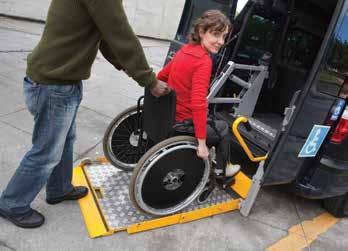
prioritise those already serving the wheelchair community, rather than forcing them into a stressful, competitive process: “There should be a clear mechanism that gives these drivers access to funding based on their track record, not a first-comefirst-served lottery.”
Electric vehicles (EVs) offer a more promising outlook, with more accessible grants and scrappage incentives, but even these are not immune to rising prices. “Even a standard taxi vehicle now can set you back €40,000 to €50,000,” Alan notes, citing postCOVID price inflation and the wider cost-of-living crisis.
“There’s no doubt that many drivers are open to moving to electric vehicles,” says Alan. “But they’re being pushed into it because of policy decisions like the refusal to extend the age limit of existing vehicles. For many, switching to EVs isn’t a real choice – it’s the only option left.”
According to Alan, while around 60% of drivers are satisfied with their EV experience, a significant minority remain deeply concerned. Chief among these concerns are the inadequate charging infrastructure and limited vehicle range, both of which pose serious challenges for drivers covering long distances or working unsociable hours.
“It’s all well and good having electric vehicles,” he says, “but when you’re carrying passengers late at night or going crosscountry, you have to think about whether you can get a charge – and that’s a stressful calculation for any professional.”
The range limitations and uneven availability of charging stations, particularly outside major urban centres, mean that for many drivers, switching to an EV can feel like a gamble. “Right now, I’d say Ireland isn’t ready for EVs in the taxi industry – not without proper support,” Alan concludes.
Government grants are available for taxi drivers switching to EVs, but Alan argues that current schemes fall far short of what’s needed. “The grants are there, but the costs have gone through the roof. Vehicles that once cost €45,000 are now priced at €95,000. The supports need to reflect the real cost of entry.”
He also highlights the financial burden on drivers, who, unlike public transport operators, receive no subsidies. “Taxi drivers are sole traders. We pay for our own vehicles, insurance, maintenance – it all comes out of our pocket. If the government wants a modern, wheelchair-accessible, green fleet, they need to step up with better incentives and a clearer roadmap.”
Safety, too, is a growing concern. Anti-social behaviour,

intoxicated passengers, and even racial abuse make night shifts increasingly difficult. While welcoming the recent NTA fare hike, particularly the new late-night tariff introduced to encourage drivers to work weekends, Alan says more must be done. “We need better training in dealing with difficult situations and a zero-tolerance policy for abuse against drivers.”
A major source of frustration is the recent decision by the NTA to extend the 10 year vehicle rule by only one year for 2015-registered cars. Alan and others had proposed a blanket two-year extension for all vehicles from 2015 to 2025 to reflect the severe financial disruption drivers faced during the pandemic.
“We were very disappointed,” he says. “This decision was discriminatory. Many drivers were out of work for two and a half years during COVID. Some have since exited the industry altogether – men who got no reimbursement, whose licences lapsed, or who died without recognition. The extension would have been a lifeline.”
Despite the challenges, Alan still holds a strong belief in the value of the profession and the community it serves. He calls on policymakers to support the sector through better grant structures, inclusive vehicle policies, improved training, and a re-commitment to the idea of taxi driving as a proud, full-time profession.
“It’s time to take ownership again,” he concludes. “We need to lift the standards, support the drivers who’ve committed their lives to this work, and make the industry something young people can aspire to join – not something they fall into when they need a few extra euros.”
Alan’s vision is one of balanced reform – a sector that maintains high standards, supports professional drivers, and adapts to modern needs without compromising public safety or driver livelihoods. His leadership combines personal legacy, industry experience, and a future-focused mindset.
“We can do better,” he concludes, “but only if we remember what this industry is about: service, trust and community.”
In the face of global disruption, Alan’s message is clear: Ireland’s taxi industry must not be sacrificed to serve the interests of corporate giants. The Irish Taxi Drivers’ Federation, he insists, will continue to be a steadfast defender of drivers and a voice for common sense.


Mr Gearbox Mr Clutch is the longest established gearbox and clutch repair specialist in Ireland.
⁕ Free estimates
⁕ Diagnosis for most makes and models’
⁕ Warranty on all parts and labour
⁕ Only manufacturers’ standard parts used
⁕ Manufacturer’s spec clutches fitted
⁕ Collection and delivery within the M50 corridor
⁕ Same day service (subject to parts availability)
Contact us today: Tel: (01) 8568133 or 087 4008 077 Email: info@mrgearboxmrclutch.ie 72 Ballygall Rd West, Finglas, Dublin Open: Mon-Thurs 9am to 5pm








Taxi drivers across Ireland face a unique set of challenges - tight schedules, long hours, and the constant need to stay on the road. At RedClick, we understand that when your taxi stops, so does your livelihood. That’s why we’ve designed taxi insurance that just clicks: comprehensive cover, award winning claims service, and competitive pricing.
Part of the Generali Group, RedClick entered the Irish market via acquisition in 2024 and has continued to grow as a trusted name for taxi drivers across the country. Building on Generali’s 190-year history of protecting customers worldwide, we’re proud to bring our global expertise to Ireland. Generali is one of the largest insurance and asset management providers in the world, and as part of this trusted group, RedClick combines local knowledge with international backing to deliver top-tier solutions tailored to your needs.
Competitive premiums are essential for taxi drivers - and it’s something we take seriously. That’s why RedClick offers competitive pricing designed to make your insurance work as hard as you do.
Taxi drivers need more than just basic insurance - they need comprehensive cover that keeps their business running smoothly. Our policies are packed with practical features designed to give you peace of mind: Breakdown Cover with Homestart: Whether you’re parked outside your home or stranded on the side of the road, our breakdown cover gets you back on the move quickly. This is
included as standard with all our policies. Windscreen Cover: Cracks or chips can stop you in your tracks, but with RedClick, you’re covered for repairs or replacements. This is included as standard in our comprehensive cover or as an optional add on with our third-party fire and theft cover. New Car Replacement: As part of our comprehensive cover, if within 12 months of having bought a vehicle as new, it is severely damaged or stolen, we will replace it with a new vehicle of the same make and model.
All benefits are subject to policy terms and conditions. These features are designed with one goal in mind: keeping you on the road and minimising the financial impact of unforeseen events.
We have partnered with TaxiFair, a specialist taxi insurance broker, to provide expert advice and support to help you get to work in the most cost-effective manner, without compromising on levels of cover.
Contact TaxiFair’s team of insurance experts on 01 4851996 or help@taxifair.ie for a competitive quotation.
Generali Seguros y Reaseguros, S.A.U., trading as RedClick and Generali, is authorised by the General Directorate of Insurance and Pension Funds in Spain and is regulated by the Central Bank of Ireland for conduct of business rules.

This year marks the 50th anniversary of the Irish Taxi Drivers' Federation (I.T.D.F.), the longest-established and most influential representative organisation for the taxi industry in Ireland. Since its founding in 1974, the Federation has stood as a steadfast advocate for taxi drivers, offering representation, services, and support through some of the most turbulent periods in the industry’s history. As the I.T.D.F. reaches this important milestone, it is timely to reflect on the immense contribution it has made to supporting drivers and shaping the modern taxi landscape.
The I.T.D.F. was established to protect and promote the interests of Irish taxi drivers. Over the decades, it has become an essential institution, advocating for fair working conditions, sustainable income, and respect for the taxi profession as a vital part of the national transport network. The Federation provides a wide range of services to its members, including assistance with income tax returns, mortgage advice, insurance quotes, and representation with state agencies such as the Garda Carriage Office and the National Transport Authority (NTA), as well as individual driver consultations.
Throughout its history, the I.T.D.F. has fought tirelessly on behalf of drivers, many of whom work long hours in often challenging conditions. While the Federation was ultimately unsuccessful in its campaign against the 2000 deregulation of the industry - a seismic event known as the “big bang”- it has remained a powerful voice in efforts to address the fallout and rebuild fairness and order in the sector.
One of the most defining events in the history of the Irish taxi industry occurred in 2000, when the government implemented radical deregulation measures, removing the cap on the number of taxi licences. The resulting surge in licence holders drastically increased competition and drove down earnings for full-time drivers. Many found themselves struggling to make a living, with the market flooded by part-time entrants who often worked only during peak periods and took the most lucrative fares.
The Federation had long warned that unregulated access to the industry would have serious consequences, and many
of its predictions came true. Tensions grew among drivers, and dissatisfaction with regulatory authorities mounted. From 2004 to 2011, a dedicated Commission for Taxi Regulation sought to bring greater oversight, but by 2011, responsibility was transferred to the NTA under the Public Transport Regulation Act.
The emergence of other industry bodies such as the Irish Taxi Council (ITC), formed in 2009, reflected a growing demand for representation and reform. Protests, including high-profile blockades of Dublin’s O’Connell Street, underscored the desperation many drivers felt. However, through it all, the Irish Taxi Drivers' Federation remained a consistent and constructive voice for progress.
Among the most influential figures in the Federation’s history was John Ussher, who served as President until his passing in 2014. Ussher was widely respected for his dedication, advocacy, and deep understanding of the struggles faced by taxi drivers. His leadership during some of the industry’s most difficult years helped to solidify the Federation’s role as a central pillar of support for drivers across the country.
John Ussher’s contributions to the Federation were immense. Before his election as President, he served as a key representative for Shamrock Cabs and was thrust into prominence during the fallout from the global Oil Crisis. His steady hand during that period, ensuring fuel supply continuity for drivers amidst national shortages, earned him the respect and trust of his peers. This calm, decisive leadership became a hallmark of his presidency.
John’s own story exemplified the challenges faced by many in the profession. He entered the trade in the early 1970s and vividly recalled having to borrow car parts just to stay on the road. Supporting a young family on a taxi driver’s wages was often an uphill battle, and like many of his peers, John worked long hours – often 14 hours a day – to make ends meet.
The taxi industry of the 1970s and 1980s was chaotic and largely unregulated. When Ussher began his leadership journey, the sector was flooded with new entrants, licences were handed out for a nominal fee, and standards varied significantly across the country.
Together with colleagues like Martin Morris, Ussher worked to bring order to this chaos. He played a central role in persuading Fianna Fáil, prior to the 1977 general election, to adopt a policy of regulating licence issuance. His behindthe-scenes political engagement helped usher in a controlled licensing system, giving local authorities the power to manage licence volumes and restrict operations geographically - a move that brought long-awaited structure to the sector.
He led the Federation through an era that saw both improvements and severe setbacks for the industry. While the 1978 introduction of regulation brought some stability, Ussher believed the deregulation of 2000 marked a return to the hardship of earlier decades. This decision saw taxi licences granted freely without limit, leading to a surge of new drivers and a drastic collapse in income levels for existing operators. Ussher, with the backing of the Federation, vocally opposed the manner of deregulation, warning that an unregulated influx would erode professional standards, undermine livelihoods, and introduce “undesirable elements” into the trade. Despite opposition, his warnings proved prescient.
Under Ussher’s direction, the Federation joined forces with the

National Taxi Drivers Union (NTDU) to form the Dublin Area Taxi Organisation - a united front against deregulation. While the NTDU advocated for the appointment of a taxi regulator, Ussher and the Federation remained critical, concerned that such a role would become a bureaucratic burden rather than a support. In time, the industry was not only deregulated but encumbered by a growing thicket of rules, many of which Ussher decried as impractical or illogical - such as restrictions on private hire pricing and the nontransferability of licences, which he argued denied drivers and their families basic rights of succession and retirement.
Ussher frequently spoke out about the toll that long hours, low pay, and uncertain conditions were taking on drivers and their families. Despite the pressures of the role, John remained committed to improving conditions for his colleagues, often sacrificing personal time and comfort to meet with drivers and advocate for change.
For over 30 years, the Federation was guided by his steadfast leadership and his untimely death in 2014 marked the end of an era. His presidency, which began in 1983, was defined by unwavering commitment, calm leadership through turbulent times, and relentless advocacy on behalf of taxi drivers nationwide. In the decades to come, his legacy will remain etched in the history of Ireland’s taxi industry - a testament to what principled leadership and unrelenting dedication can achieve. Through advocacy, strategic negotiation, and moral authority, he transformed the Irish Taxi Drivers' Federation into a respected and influential voice for thousands of drivers, leaving behind not only a legacy of achievement but a roadmap for those who follow.
When John Ussher passed away in October 2014, tributes poured in from across the country. His successor, Joe Heron, described him as: “A loyal friend, great company, and a tireless advocate for the taxi profession.” Heron recalled that Ussher treated all members with respect and was the first to help anyone in need. His absence, Heron noted, was deeply felt - not only within the Federation but across the broader taxi community.
Stepping into the role, Heron acknowledged the challenging legacy he inherited, not only the position but also the weight of Ussher’s enduring legacy and the significant challenges still confronting the sector. His priorities included growing Federation membership, particularly among newer drivers unfamiliar with the I.T.D.F.’s historic advocacy. Under his leadership, the Federation continued to offer industry and individual representation as well
as insurance and financial services, and negotiation with agencies such as the National Transport Authority, Garda Carriage Office, and Dublin Airport Authority.
Heron faced his own challenges and cited the fragmented landscape of industry representation and the marginalisation of driver voices on policy-making bodies like the Taxi Advisory Council, where commercial and disability interests often outweigh those of the drivers themselves. Additionally, he raised concerns about the current practice of directing all driver correspondence to the NTA rather than to Ministers, which he said weakened democratic engagement and accountability.

Despite the hurdles, Heron remained optimistic and committed throughout. He supported grant-funded wheelchairaccessible vehicles but believed that far deeper and more wide-ranging reform was needed, including a return to numerical licence controls and the introduction of more practical, driverfriendly regulations. As he continued to build on Ussher’s work, Heron remained focused on unity, fairness, and safeguarding the future of the profession.
On the 6th of January 2000, Junior Progressive Democrat Minister for the Environment, Mr. Robert Molloy, introduced plans to issue 3,100 new taxi plates. This plan to increase the supply of taxis was initiated due to a constant shortage of taxis in Ireland and would ultimately lead to deregulation.
Reflecting on his early years in the Federation - he became Chairman in 1976 - Herron recalled an era of unregulated entry, when taxi licences cost just £1 for three years and anyone could join the profession. Working alongside John Ussher, Herron helped secure political support for controlled licensing and the geographical zoning of permits, marking a turning point for the profession.
However, deregulation in 2001 dismantled those controls, leading to an oversaturated market and significant drops in driver income. Herron noted that the sudden opening of the sector created long-term issues, attracting “undesirable elements” and spawning layers of expensive, ineffective regulation.
Later, Herron turned his focus to the increasingly dangerous working environment faced by taxi drivers. He was vocal in his support for the National Transport Authority’s campaign to promote respect for taxi drivers, describing it as a muchneeded step following several violent and racially motivated attacks. “Taxi drivers are people too,” Herron said, calling for public recognition of the abuse many drivers routinely faced.
While Herron opposed mandatory partitions - citing the unique Irish tradition of front-seat passenger interaction - he welcomed the growing use of CCTV and cloud-based security systems in vehicles and continually advocated for greater safety, more balanced regulation, and a renewed appreciation of a profession that has long served as a vital part of Ireland’s transport system.
Joe Heron, who sadly passed away during COVID-19 will be remembered in the taxi industry for having continued the Irish Taxi Drivers' Federation mission and ensuring it remained a strong, effective voice for drivers. Among the Federation’s priorities during Heron’s tenure were to maintain and enhance grant aid for wheelchair-accessible vehicles, improving driver security, reducing fines for minor infractions, and gaining more taxi rank space in cities.
During this period, the I.T.D.F. also lobbied extensively for a
reduction in the number of part-time drivers and urged the NTA to reinvest a portion of the more than €20m it has collected in licence fees back into the industry.
One of his most pressing concerns remains the long hours and modest earnings many drivers endure. “There are taxi drivers working as many as eighty hours a week for very modest wages,” Heron remarked in one interview with the Irish Taxi Drivers' Federation magazine. “That’s simply not sustainable.”
Joe Heron was succeeded by Alan Cooley, part of a younger generation of taxi drivers who is determined to restore professionalism in the industry and fight the race to the bottom which is being led by the emergence of app companies such as Bolt and Uber.
As the Irish Taxi Drivers' Federation marks five decades of service, its role remains as critical as ever. Through advocacy, support, and solidarity, it has helped drivers navigate a landscape shaped by shifting regulations, economic pressures, and evolving consumer demands. It has stood firm through deregulation, protest, and reform - and it continues to fight for a fairer, more stable future for Ireland’s taxi industry.
In honouring its past and planning for the future, the Irish Taxi Drivers' Federation’s 50th anniversary is not only a celebration of longevity, but of resilience, unity, and the enduring importance of collective voice in a challenging profession.
1978: The industry was initially regulated, with improvements perceived by some drivers.
2000: “Big bang” deregulation, removing barriers to entry and leading to increased competition and tensions.
2004-2011: The Commission for Taxi Regulation (later known as the Taxi Regulator) was established to regulate small public service vehicles, including taxis.
2009: The Irish Taxi Council (ITC) was formed to represent the interests of taxi drivers.
2009-2010: ITC staged protests over the number of taxi licences, including blockades of Dublin’s O’Connell Street.
2011: The Commission for Taxi Regulation was dissolved with the implementation of the Public Transport Regulation Act 2009.
Present: The National Transport Authority (NTA) now regulates the taxi industry and issues licences. Organizations like the Irish Taxi Drivers' Federation and the Irish Taxi Council continue to advocate for the interests of taxi drivers and the industry.
Challenges and Trends:
Deregulation and Tensions: The initial deregulation led to a surge in taxi numbers, creating tensions between established drivers and new entrants, including those with different cultural backgrounds.
Re-regulation: In recent years, there’s been a move towards more stringent regulation, including stricter licensing and assessment policies, and increased surveillance of drivers.
Driver Shortages: The industry faces a growing shortage of drivers due to an aging workforce and a lack of younger people entering the profession.
Industry Organisations: Groups like the Irish Taxi Council and the Irish Taxi Drivers' Federation play a significant role in representing the industry’s interests and advocating for changes.
Consumer Concerns: The NTA aims to ensure quality services for all passengers.

We are sole agents for Taxitronic and Cygnus meters/printers. We supply roofsigns and are specalists in wheelchair conversions. Robinson Auto are proud to be the sole distributor for BStyle mobility solutions in












The MG4 EV is redefining electric driving for Ireland’s taxi drivers, combining cutting-edge technology, exceptional efficiency, and award-winning design. Named Irish Times Car of the Year 2023, the MG4 EV has earned recognition for its innovation, performance, and practicality.
As an automatic transmission vehicle, the MG4 EV provides a smooth, effortless driving experience - perfect for long hours behind the wheel. Designed with both drivers and passengers in mind, it offers up to 450km of range on a single charge (WLTP), ensuring fewer charging stops and more time on the road.
MG has rapidly grown into one of Europe’s fastest-growing EV brands, with the MG4 leading the charge as a top-selling electric hatchback. Since its launch, the MG4 has consistently ranked among Ireland’s top five best-selling EVs, reflecting its growing popularity and strong market presence.
Inside, passengers benefit from a spacious and comfortable cabin, while drivers enjoy cutting-edge technology like the 10.25” touchscreen with Apple CarPlay™ and Android Auto™, keeping them connected on the go. Lower running costs and zero emissions make the MG4 EV a smart, sustainable choice for taxi operators looking to reduce fuel and maintenance expenses.

Charging is convenient and time-efficient, with the ability to charge from 10% to 80% in just 35 minutes using a rapid DC charger. The MG4 EV also supports Vehicle-to-Load (V2L) technology, allowing drivers to power external devices directly from the car’s battery - a useful feature for mobile professionals. Say YES to electric, and YES to the MG4 EV - the future of sustainable, cost-effective, and high-performance taxi driving in Ireland.
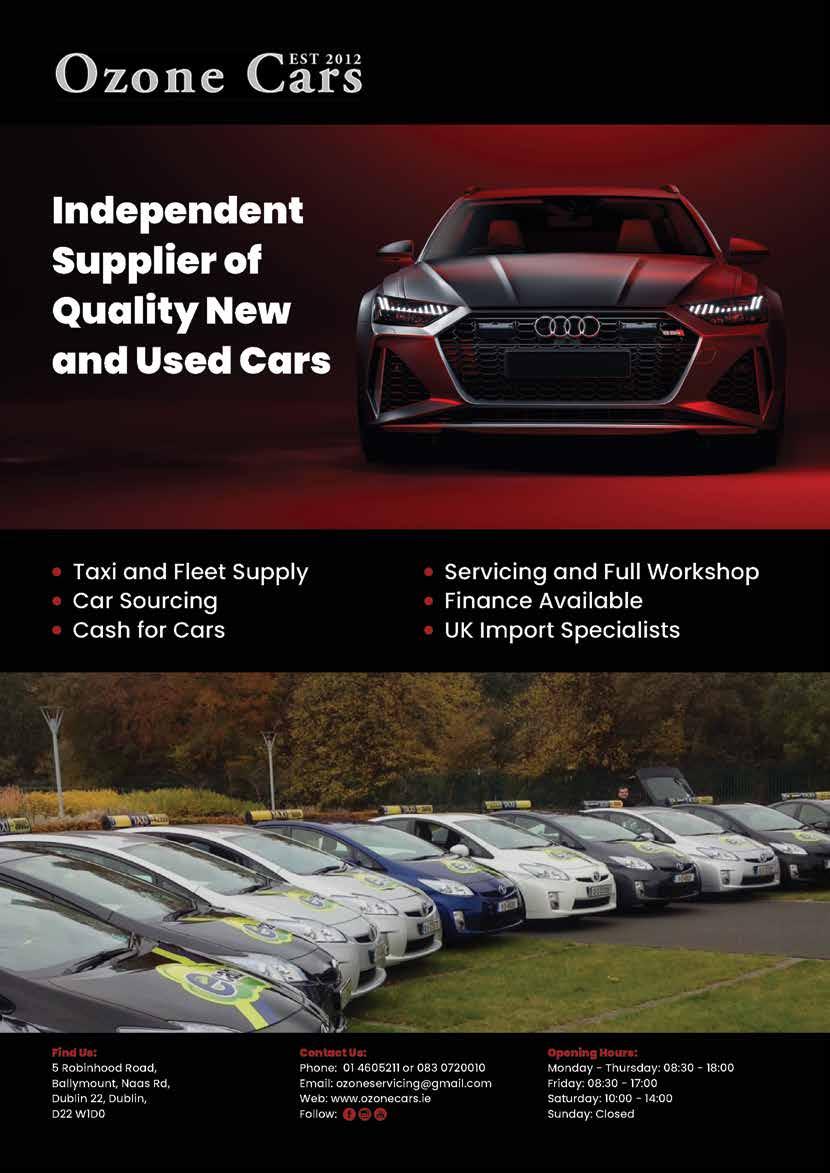
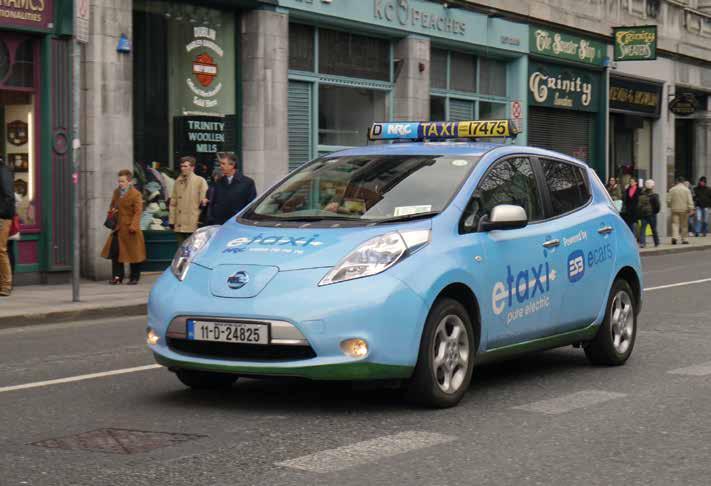
With the National Transport Authority aiming for 40% of all taxis in Ireland to be electric or hybrid by 2030, the road ahead looks clean, green, and increasingly electric.
Driving an electric car isn’t just about reducing your carbon footprint. EVs offer lower running costs, reduced maintenance expenses, and access to government incentives. These perks make EVs a wise investment for taxi drivers.
Ireland’s commitment to reducing carbon emissions and building a greener transport network is accelerating rapidly and the taxi industry is playing its part. With the government’s target of cutting greenhouse gas emissions by 51% by 2030 and achieving net-zero emissions by 2050, taxi electrification is emerging as an important contributor. The industry’s adoption of electric vehicles is being fuelled by generous incentives and evolving technology that is making electric vehicles (EVs) more accessible and cost-effective than ever.
At the heart of the push is the eSPSV Grant Scheme, which offers taxi drivers switching to electric up to €20,000, with an additional €5,000 available in Vehicle Registration Tax (VRT) relief. Those purchasing a wheelchair-accessible vehicle can receive up to €25,000 in support. Drivers scrapping high-mileage or ageing vehicles benefit from the highest grants, while even those without a trade-in can receive up to €10,000 toward a new EV.
The scheme has proven immensely popular - so much so
that it ran out of funding before being relaunched last year. Over 2,800 electric taxis have already been purchased under the initiative, and new, dedicated EV charging points for taxis are being rolled out at transport hubs like train stations.
One standout success is Dublin taxi driver Paul Clooney, who drove over 300,000 kilometres in his Nissan LEAF before replacing it last year for just €1,955, thanks to the full €20,000 government grant and Nissan’s €6,500 trade-in boost, which was available until August 2024. “I paid €3,900 because I went for a higher spec, but it’s still saving me a fortune,” said Paul. “You can’t say that about any other taxi out there.”
This deal, which Nissan called a “no-brainer,” highlights the considerable variety of incentives routinely made available for EV adoption and the rapidly declining cost barrier. Other private sector players like FREENOW are also contributing to the EV push. Lat year, the ride-hailing platform partnered with Tesla to offer up to €5,400 off the price of a Model 3 or Model Y
Other private sector players like FREENOW are also contributing to the EV push. Last year, the ride-hailing platform partnered with Tesla to offer up to €5,400 off the price of a Model 3 or Model Y for driver partners.

for driver partners.
Combined with the eSPSV grant, the savings achieved were as much as €26,590 - dramatically lowering the cost of entry into a new electric taxi. The response was immediate and over 450 taxi drivers expressed interest within two weeks of the Tesla-FREENOW offer being announced. In the first half of last year, FREENOW added an average of 13 new battery EVs to its fleet each week.
The environmental and economic incentives are hard to ignore. Based on the National Transport Authority’s figures, the average Irish taxi driver travels 32,600 km annually. A petrol vehicle would cost around €4,500 per year in fuel. By
comparison, a Tesla Model Y costs about €2,700 to run annually - and just €2,100 for a Model 3. Home charging with night-rate tariffs can lower costs even further.
Beyond cost, electric vehicles offer a smoother, quieter ride that enhances the passenger experience. They also demand far less maintenance - Paul Clooney noted that over six years of EV driving, his only expenses were new tyres and wipers.
Challenges remain, particularly in rural areas where charging infrastructure is still catching up, and the upfront cost, even with grants, can be daunting for some drivers. But the tide is clearly turning. Continuous investment in infrastructure, combined with attractive financial supports, is making electric taxis a viable - and often preferable - choice.
Recently, Ireland has taken a significant step forward in its transition to cleaner transport with the release of the final version of the Regional and Local EV Charging Network Plan. This comprehensive strategy outlines how local authorities will roll out electric vehicle (EV) charging infrastructure across towns, villages, and cities nationwide, addressing one of the most pressing barriers to EV adoption - lack of accessible charging facilities.
The plan, finalised following public consultation, sets clear targets for the installation of charging infrastructure in destination
A growing number of taxi drivers across Ireland are making the switch to electric vehicles - and with good reason. EVs are proving to be highly practical and economically viable, especially for high-mileage drivers.
1. Cost Savings: Electricity is considerably cheaper than petrol or diesel, with typical full charges ranging between €17–€26 depending on battery size and whether charging is done at home or publicly. EVs also have fewer moving parts, reducing the frequency and cost of maintenance.
2. Incentives and Grants: Schemes like eSPSV25 provide generous financial support to offset the cost of EVs. Drivers scrapping older, highmileage vehicles are particularly well-placed to benefit. In addition, reduced Benefit-in-Kind (BIK) tax applies to EVs, with exemptions on the first €50,000 of vehicle value still in place until 2025.
3. Emissions-Free Driving: Electric taxis produce zero tailpipe emissions, helping to improve air quality in cities and towns. As public awareness of climate change and environmental health grows, passengers increasingly favour cleaner transport options.
4. Low Emission Zone Exemptions: While not yet fully implemented across Ireland, Low and Ultra Low Emission Zones are expected to become more prevalent, especially in cities like Dublin and Cork. EV drivers can expect exemptions and priority access within these zones.
Expanding Charging
Infrastructure: Ireland’s charging network is growing steadily, with more rapid and ultra-rapid chargers being installed at strategic locations. Many taxi drivers also benefit from home charging setups, allowing them to start every shift fully powered.
6. Regenerative Braking and Smooth Driving: Perfect for stopstart city traffic, electric taxis use regenerative braking to extend range and improve efficiency. Most EVs also have automatic transmissions, making them exceptionally easy to drive and ideal for long shifts.
7. Quieter, More Comfort: EVs offer a smoother and quieter ride, reducing noise pollution and improving passenger comfort. This is especially important in urban environments where both drivers and passengers benefit from reduced stress levels.
Range: For long-distance trips, consider EVs with longer ranges, such as the Hyundai Ioniq or the Tesla Model 3.
Charging: Ensure access to convenient charging infrastructure, whether at home or public charging stations.
Initial Purchase Price: While grants can help, the initial purchase price of an EV can be higher than a comparable petrol or diesel vehicle, so consider government incentives.
Battery Life: Ensure the battery has enough range for your typical taxi shift.
and neighbourhood locations. Destination chargers will be located at public and private parking areas - such as hotels, restaurants, and town centres - and will include a mix of slow, fast, and ultrafast AC and DC chargers, based on expected parking durations. Neighbourhood charging, by contrast, will target residential areas without off-street parking, providing slow and medium-speed AC chargers suitable for overnight or long-stay use.
The plan sets ambitious targets: 169,253kW of combined charging capacity by the end of 2025, rising to 562,244kW by 2030. These goals are broken down by local authority and are based on current and projected EV adoption rates.
Minister for Transport, Darragh O’Brien, highlighted the importance of a nationwide approach: “This plan will help deliver the charging infrastructure people need, where they need it - at home, on the road, and at key destinations and neighbourhoods across communities.”
Local authorities will lead implementation, supported by Zero Emissions Vehicle Ireland through funding, staffing, and technical guidance, together with the National Road EV.
With the National Transport Authority aiming for 40% of all taxis in Ireland to be electric or hybrid by 2030, the road ahead looks clean, green, and increasingly electric.
The recent record-breaking response to the 2025 Electric Small Public Service Vehicle (eSPSV25) Grant Scheme illustrates the extent of the demand for electric vehicles among Ireland’s taxi drivers. With a budget allocation of €12.5 million, the schemewhich launched in early February - was rapidly oversubscribed, prompting the National Transport Authority (NTA) to temporarily pause applications as it assesses eligibility.
Responding to the record number of applications, The National Transport Authority (NTA) announced that the eSPSV25 Grant Scheme was fully subscribed and would be temporarily paused in order to allow the NTA to review and process the eligible applications received. Following assessment of the initial applications, it said that the scheme may reopen later in the year.
“As the NTA reviews the current applications, stakeholders and industry participants can look forward to further developments over the coming months to support the transition to a cleaner, greener transportation future,” it said in a statement.
Meanwhile, Minister for Transport Darragh O’Brien welcomed the remarkable response, calling it: “A strong endorsement of the EV transition, particularly among highmileage drivers eager to embrace a cleaner, more efficient technology. The surge in interest highlights not only the attractiveness of the grant offering but also the significant shift in the market towards greater EV adoption,” he said.
“The overwhelming response shows that the small public service vehicle industry is not only ready for change, but willing to lead it. High-mileage drivers, at the forefront of daily operations, have shown strong support for transitioning to EVs. This move not only helps reduce carbon emissions but also positions the small public sector vehicles as leaders in the nation’s broader environmental initiatives.
The current wave of enthusiasm reflects growing awareness among professional drivers of the multiple benefits that EVs offer - from cost savings and environmental impact to long-term operational advantages and marks an important step in our broader commitment to reducing emissions and supporting a more sustainable transport sector.”
As the Department of Transport and NTA continue their review of the current round of applications, there is optimism that further

The recent release of the Regional and Local EV Charging Network Plan outlines how local authorities will roll out electric vehicle (EV) charging infrastructure across towns, villages, and cities nationwide, addressing one of the most pressing barriers to EV adoption – lack of accessible charging facilities.
funding will be made available later in the year. For now, the record-breaking interest in the eSPSV25 scheme sends a powerful message - Ireland’s taxi industry is not only ready to embrace electric mobility but is already accelerating down that path.
By making the switch, drivers can unlock significant savings, modernise their fleets, and contribute to a cleaner, quieter, and more sustainable transport system - a win for businesses, passengers, and the planet alike.

With technological advances, EV range is no longer a concern for most professional drivers. Several models now offer ranges that comfortably cover a full working day or more.
• Hyundai IONIQ 5 – Up to 299 km range; spacious, stylish, and highly efficient.
• Kia Niro EV – Offers a range of up to 285 km and is known for reliability and comfort.
• MG5 EV – Practical estate with up to 250 km range; ideal for luggage and longer trips.
• Volkswagen ID.7 – Offers 485–690 km range depending on spec; perfect for rural and urban work.
• Renault Scenic E-Tech – Budget-friendly with an impressive range up to 710 km.
• Peugeot e-3008 – A versatile and affordable EV with up to 500 km range.
For drivers seeking luxury and maximum mileage, premium options such as the Mercedes-Benz EQS 450+ (690 km range) and Polestar 3 (up to 700 km) also stand out.



The National Transport Authority (NTA) introduced a significant 9% increase to the National Maximum Taxi Fare on December 1st last year. This adjustment, the outcome of the NTA’s biennial National Maximum Taxi Fare Review, aims to reflect the rising costs of operating a taxi service in Ireland and to sustain the viability and reliability of the sector.
Every two years, the NTA conducts a comprehensive review of taxi fares to ensure they remain aligned with evolving economic conditions. The 2024 Review, published in July, identified a 9% to 11% increase in operating costs for taxi drivers between 2022 and 2024. These rising costs include fuel, insurance, vehicle maintenance, and the requirement for newer, often wheelchairaccessible vehicles – particularly burdensome for new entrants to the industry.
Following the review and a subsequent public consultation, the Taxi Regulation (Maximum Fares) Order 2024 was enacted to formalise the new rates. The authority maintains that the fare increase is a critical measure to preserve service quality and encourage driver availability during high-demand periods.
The most prominent change has been the introduction of the “special rate” tariff beyond the traditional Christmas period. This premium rate now applies every weekend from midnight to 4am on Saturday and Sunday mornings, aligning with peak demand and aiming to increase driver presence during these busy hours.
Under the new fare structure:
• The initial charge for “special rate” fares is €5.40.
• The per-kilometre charge under the “special rate” is €2.20.
• Standard weekday rates remain at €1.32 per kilometre.
• The pre-booking charge has increased from €2 to €3 for all phone and app-based reservations.
The pay hikes sparked a mixed response and while it was welcomed by many within the taxi industry, including Irish Taxi Drivers' Federation President, Alan Cooley, who said it was well merited in light of significantly rising costs for drivers and given the fact that taxi drivers had foregone a fare increase during the Covid period.
While the fare increase raised concern among passengers and major app-based operators such as Uber and FREENOW, the NTA said the revised framework will incentivise more drivers to work late-night shifts and alleviate the persistent shortage of taxis during weekend peak times. Defending the increase, NTA Chief Executive Anne Graham said that the review was essential to the sustainability of the industry. “This 9% increase provides for the increasing operational costs drivers are facing while balancing the needs of the travelling public,” she said.
Graham reaffirmed the NTA’s commitment to reviewing the impact of the fare hike 12 months post-implementation to ensure that the adjustments are meeting their intended objectives and not adversely affecting accessibility or affordability.
While the fare increase has been broadly welcomed by drivers seeking improved earnings in the face of rising




for
describing it as long overdue. However, he emphasised that pricing changes alone are insufficient and that taxi drivers require further supports.
expenses, concerns remain about the broader impact on customer behaviour – particularly during typically quieter months such as January and February.
Danny O’Gorman, General Manager of FREENOW Ireland, expressed support for the increase, describing it as long overdue. However, he emphasised that pricing changes alone are insufficient and that taxi drivers require further supports. “It will get a lot more drivers onto the road at that time but they are taking more risk in doing so,” he said, referencing increasing safety concerns for drivers operating late-night shifts.
FREENOW is also lobbying for a dedicated Garda helpline for taxi drivers and for regulatory updates to enhance safety and tax compliance within the sector. While the company reported a 24% increase in driver supply on its platform in the first half of 2024, O’Gorman noted that retention and willingness to work during high-risk hours remain critical challenges.
Uber, a member of the Taxis for Ireland Coalition, has strongly criticised the fare hike, arguing that it fails to address the fundamental issue: a shortage of drivers. Uber Ireland Head, Kieran Harte, warned that the changes could negatively impact the night-time economy and place an additional financial burden on those who depend on taxis for safe, late-night travel.
“Raising prices back in 2022 by 12% didn’t bring more drivers out to work at weekends. We don’t think it will do so this time either,” Harte asserted. He emphasised that increasing fares is not a long-term solution and highlighted the need to attract more drivers into the industry – recommending a 30% increase in taxi drivers and vehicles on Irish roads by 2027.
Harte also raised concerns about the local area knowledge test, which prospective drivers must pass. He suggested revisiting this requirement in light of modern navigation technologies that can now provide real-time route optimisation, further questioning its necessity.
Like FREENOW, Uber has called for additional investment in safety measures and accessibility, while also acknowledging progress in the number of wheelchair-accessible taxis, which now make up over 20% of the fleet.
Despite the criticism, the NTA stands by its decision. The fare increase is not solely about economics – it also aims to address availability, particularly during high-demand periods when service reliability suffers. The introduction of the weekend “special rate” is designed to create a more attractive proposition for drivers and, in turn, improve availability for passengers.
To assist in deciding the extent of the fare increase warranted, The National Transport Authority (NTA) published new data estimating the indicative costs of operating a Small Public Service Vehicle (SPSV), in Ireland. The report acknowledges the wide variability in operational conditions across the industry. While the average in-service mileage for a taxi is estimated at 32,600 km annually, individual circumstances differ. Costs are accordingly split into fixed and variable categories, based on assumptions that reflect typical usage.
Fixed costs include vehicle ownership, licensing, and dispatch affiliation. Vehicle costs vary significantly depending on the type, age, and financing method. For example, a nearlynew eight-seater vehicle may cost up to €6,737 per year over five years, while a five-year-old wheelchair accessible taxi (WAT), benefiting from NTA grants, may cost as little as €1,815. Dispatch fees – charged either as a flat weekly rate or a commission per trip – can total around €4,752 annually for full-time drivers. Other fixed costs include motor tax, SPSV licensing, and meter calibration.
Insurance represents one of the most variable yet significant cost factors. Premiums depend heavily on the driver’s experience and claims history. A new entrant with a clean five-year private driving record may pay upwards of €6,500 in the first year, while an experienced driver could see this reduced to €2,000 or less after five years. Costs also vary by vehicle type, with eightseaters generally more expensive to insure than smaller saloons.
Variable costs largely revolve around fuel and maintenance. Annual fuel costs can range from €1,720 for a modern saloon to almost €3,000 for larger vehicles. Maintenance costs increase with vehicle size and include servicing, tyres, and essential parts. Annual cleaning and miscellaneous running costs average about €1,300 for standard taxis, rising slightly for WATs due to additional equipment.
Between 2022 and 2024, taxi operating costs rose by an estimated 9–11%. In response, the NTA approved a 9% fare increase from December 2024 to help operators manage rising expenses while maintaining service availability.
While the report offers indicative guidance only, it serves as a valuable benchmark for current and prospective taxi operators assessing the economic viability of their services in a changing cost environment.
Introduced by the National Transport Authority (NTA) in 2010, the ten-year rule caps the operational lifespan of standard taxis and hackneys at a decade. The intent was to ensure that vehicles on Irish roads remained modern, safe, and comfortable for passengers.

The Irish taxi industry has received a temporary reprieve in the form of a one-year extension to the long-standing ten-year rule governing vehicle age limits. From April 1st, 2025, taxi drivers operating vehicles first registered in 2015 have been permitted to continue working for an additional year, up to 2026 - provided they meet all relevant Public Service Vehicle (PSV) roadworthiness standards.
While seemingly a modest change, this move addresses growing concern across the sector regarding falling taxi numbers, anomalies in the regulation, and the cost burden on drivers.
Introduced by the National Transport Authority (NTA) in 2010, the ten-year rule caps the operational lifespan of standard taxis and hackneys at a decade. The intent was to ensure that vehicles on Irish roads remained modern, safe, and comfortable for passengers. Unlike vintage limousines, which are exempt, and wheelchairaccessible vehicles, which enjoy a 15-year limit, standard taxis have faced a firm cut-off at the ten-year mark.
Once a vehicle surpasses this age, it becomes ineligible for a licence renewal, forcing drivers to invest in a replacement vehicle.
The rationale for the rule was originally sound: to enhance public confidence in taxi services by maintaining high safety and quality standards. It aligned with the objectives set out in the Taxi Regulation Acts of 2013 and 2016, which charged the NTA with promoting quality services and a professional SPSV sector.
However, the landscape shifted dramatically during and after the COVID-19 pandemic. The industry suffered a significant decline in business, making it difficult for many operators to invest in new vehicles. A temporary suspension of the rule was granted during the pandemic, and the 2022 regulations introduced staggered extensions to allow older vehicles to remain in service longer. These provisions were intended to provide breathing room amid supply chain
challenges and subdued passenger demand.
Despite signs of recovery, taxi numbers have not returned to prepandemic levels. As of April 2024, there were approximately 12,990 taxis in operation, down 2,000 from before the pandemic. Moreover, the number of taxi licences issued has nearly halved since 2009, a statistic highlighted by industry group Taxis for Ireland. With just 784 taxis registered in 2019 compared to 1,489 in 2015, the downward trend continues to worry stakeholders.
These figures underscore growing concern about the sustainability of the sector, particularly in light of increasing demand for late-night services and a push to revive the night-time economy. The availability of grants such as the eSPSV (Electric Small Public Service Vehicle) and WAV (Wheelchair Accessible Vehicle) schemes offers some financial support, but even these have proven inadequate due to oversubscription.
Recent Dáil and Seanad debates have brought the ten-year rule into sharp political focus. In the Seanad, Labour Senator Marie Sherlock has raised strong concerns about the rule’s inconsistencies and the blunt nature of its implementation. She pointed out that a taxi registered in 2015 would face retirement in January 2025, while older vehicles from 2012–2014 could continue
operating due to previous pandemic-era extensions. This anomaly, she argued, penalises drivers unfairly and ignores the financial and environmental realities of modern vehicle ownership.
Sherlock also criticised the logic of enforcing a rigid age cut-off when vehicles must pass rigorous safety tests every six months. Her call for a more flexible, condition-based approach was echoed by others in the chamber, including Fine Gael’s Kieran O’Donnell, who nevertheless reiterated the NTA’s regulatory independence and the need for uniform standards.

In the Seanad, Labour Senator Marie Sherlock raised strong concerns about the rule’s inconsistencies and the blunt nature of its implementation.
The Irish Government and the National Transport Authority (NTA) have come under intensifying pressure in recent months to relax the contentious rule. With warnings of a looming mass exodus from the industry, calls have been mounting from taxi representatives, opposition TDs, and the public alike to implement a more flexible and realistic policy, with critics urging a rethink of the ten-year rule in light of environmental concerns, economic pressures, and the need to retain experienced drivers.
Sinn Féin’s Transport spokesperson John Brady, among others, has been vocal in urging the Government to scrap the blanket enforcement of the rule, particularly for vehicles that continue to meet safety and suitability standards. Brady called on the Minister for Transport to reconsider what he described as a decision that could drive thousands of drivers out of the profession. “This rule is forcing drivers to replace vehicles that remain perfectly roadworthy,” he said. “We need a policy that supports retention in the sector, not one that forces experienced drivers out.”
Taxi drivers and representative organisations such as Taxis for Ireland have highlighted the acute pressures being felt on the ground. Since 2009, the number of taxi licences has dropped by nearly 50%. In 2025 alone, almost 4,000 drivers were projected to face a cliff-edge decision to either replace their vehicles or exit the industry. Estimates suggest that more than 5,000 drivers could ultimately be forced out if the rule were left unchanged.
The stakes are high. A shrinking taxi fleet poses broader implications for urban mobility, tourism, and sectors like hospitality and events, which rely on a dependable taxi network. A shortage of drivers is already impacting peak-time availability and service coverage, particularly outside of Dublin.
In response, the National Transport Authority initiated a public consultation process, inviting input from licence holders and members of the public on proposed amendments to Regulation 31. The consultation, which closed on 12 March 2025, focused on a draft regulation to provide a one-year extension for vehicles first registered in 2015, pushing their maximum operation date to 2026.
Following the consultation, the NTA Board approved the Taxi Regulation (Taxi Maximum Permissible Age) Regulations 2025. The regulation, which came into effect on 1 April 2025, effectively enacts the Government’s commitment in the 2025 Programme for Government to extend the limit for these vehicles.
Minister for Transport Darragh O’Brien welcomed the move as both timely and necessary. “This change delivers on our programme commitment and acknowledges the severe financial
pressure drivers have been under since the pandemic,” he said. “It also ensures that roadworthy vehicles can remain in operation for another year, helping to retain vital capacity in the industry.”
While the one-year extension offers temporary relief, it is not a long-term solution. The NTA has stated clearly that it does not anticipate further extensions, noting that the market conditions which justified earlier reprieves - particularly supply issues - no longer exist. However, with more than 1,000 taxis potentially facing retirement in 2025, and industry representatives warning of worsening shortages, the issue is far from settled.
Many in the industry agree that the one-year extension is only a temporary fix. Supply chain issues, particularly for electric vehicles (EVs), continue to challenge operators. The Government’s eSPSV Grant Scheme, offering up to €25,000 to drivers for switching to electric, was recently suspended due to high demand and limited funding. Although hailed by Minister O’Brien as evidence of a strong appetite for cleaner transport, the suspension highlights the difficulty many drivers face in accessing suitable replacements.
However, Alan Cooley, President of the Irish Taxi Drivers' Federation, criticised the decision to grant only a one-year extension to 2015-registered taxis under the ten-year rule. He described the move by the National Transport Authority (NTA) as discriminatory, arguing that all vehicles from 2015 to 2025 should have been given a two-year extension.
Alan said the Federation’s comprehensive proposal was ignored and that the limited concession failed to acknowledge the severe financial hardship drivers faced during COVID-19, when many were out of work and unable to make payments or access credit. He believes the decision has forced many, especially older drivers, out of the industry.
Alan expressed disappointment that the NTA “did as little as they could” and acted only on the narrowest interpretation of the Programme for Government. While the Federation hoped for fairness across the board, he now concedes that the issue is effectively closed, leaving many drivers unsupported.
Nonetheless, the decision to amend the rule for 2015-registered vehicles is a welcome relief for many, although it is unlikely to quell calls for broader reform. As Sinn Féin TD Darren O’Rourke pointed out, the Government must engage meaningfully with driver representatives and consider further flexibility, especially given the backlog of affected drivers and the affordability crisis in the secondhand vehicle market.
Whether the Government and NTA will act to revise the rule more fundamentally remains to be seen. For now, the extension buys some time - for both drivers and policymakers - to chart a more sustainable path forward for Ireland’s taxi industry.
Ultimately, the NTA and Department of Transport face a pivotal moment. A short-term extension will provide some breathing room, but only a long-term strategy that balances safety, sustainability, and viability for drivers will restore confidence in the sector and prevent further decline.
Contact TaxiFair’s team of insurance experts on 01 4851996 or help@taxifair.ie for a competitive quotation.

Safe, responsible driving not only keeps passengers and other road users safe but helps build a strong no-claims history, reducing insurance costs year after year.
For professional taxi drivers in Ireland, a vehicle is not just a means of transport – it is the core of their livelihood. From bustling urban centres to quieter rural roads, taxi drivers face unique risks that go far beyond those encountered by the average motorist. This is why specialised taxi insurance is not just advisable – it is legally required under the Road Traffic Act. Understanding the various types of taxi insurance coverage, factors affecting premiums, and how to secure the right policy is crucial for protecting both your
business and the passengers you serve.
Whether you operate a public hire taxi that picks up passengers on the street or a private hire vehicle that works by pre-booking only, the law requires that your vehicle must be adequately insured for commercial passenger transport.
Unlike standard car insurance, taxi insurance provides cover for professional use, ensuring both driver and passenger are protected in the event of an accident. It also offers additional
layers of protection that reflect the realities of professional driving, such as loss of income cover and public liability insurance.
For taxi drivers in Ireland, insurance isn’t just a regulatory obligation – it’s a critical safeguard that protects livelihoods, passengers, and vehicles. With various insurance products on the market, understanding the range of options and choosing the right level of coverage can significantly affect both peace of mind and long-term financial sustainability.
The foundation of taxi insurance in Ireland begins with Third-Party Only coverage, which is the legal minimum required. This policy type covers injuries or damages inflicted on other road users but does not extend to the taxi driver’s own vehicle. While it satisfies legal obligations, it offers limited protection and may not be adequate for those heavily reliant on their vehicle for daily income.
Third-Party Only coverage covers injuries or damages inflicted on other road users but does not extend to the taxi driver’s own vehicle. While it satisfies legal obligations, it offers limited protection and may not be adequate for those heavily reliant on their vehicle for daily income.
Building on this is Third-Party, Fire, and Theft insurance. This mid-tier option includes all the benefits of third-party cover, while also offering compensation for damage from fire or the theft of the insured vehicle. It strikes a balance between cost and protection, making it a common choice among drivers with moderately valued vehicles.
At the top end of the spectrum lies Comprehensive Cover, offering the most robust form of protection available. It includes all the aforementioned elements and adds cover for accidental damage to the insured taxi, vandalism, and even natural disasters. For those with high-end or wheelchair-accessible taxis, comprehensive cover provides peace of mind, particularly given the higher replacement costs and risks associated with specialist equipment.
In addition to vehicle-focused policies, several supplementary insurance types are tailored specifically to the needs of commercial drivers. Public Liability Insurance protects against claims made by passengers or members of the public who may be injured while entering, exiting, or travelling in a taxi. For those who manage fleets or employ drivers, Employer’s Liability Insurance is essential, covering claims made by staff injured in the line of duty.
For drivers whose livelihood depends entirely on their vehicle, Loss of Income Cover is an invaluable safety net. This policy provides financial support during periods when the taxi is out of service due to accidents or mechanical failures. Meanwhile, Breakdown Assistance ensures drivers can return to work quickly in the event of unexpected mechanical issues – a critical service for those with tight schedules and regular passengers.
Other useful cover options include Personal Accident Cover, which offers compensation in the event of injury to the driver or passengers during a journey, and Windscreen Cover, which handles the cost of repairs or replacements – a frequent necessity for those clocking up extensive road time. These options are particularly relevant for wheelchair-accessible taxis,
which not only have higher equipment costs but may also pose greater liability due to their specialist function.
The cost of taxi insurance can vary significantly depending on a range of factors. Vehicle type and age is one such factor, with newer or high-spec vehicles typically incurring higher premiums. Driver experience, including the length of service and driving history, plays a substantial role, as does location –urban drivers, for example, tend to face higher premiums due to increased risk of incidents.
Other pricing influences include annual mileage, with more time on the road equating to greater exposure, and the type of hire - public hire taxis (such as those hailed on the street) usually cost more to insure than private hire vehicles. A No Claims Bonus can dramatically reduce premiums over time, rewarding drivers who avoid accidents or insurance claims. Additionally, installing security features like alarms or GPS trackers may contribute to lower premiums.
When seeking the right policy, price should never be the sole consideration. Comparing multiple quotes – either through online platforms or specialist brokers – is a crucial first step. Consulting insurers who specialise in taxi or commercial vehicle coverage can often yield more tailored policies and competitive rates. Equally important is ensuring the policy actually meets the operational needs of the driver or business.
Bundling various policies under a single provider can offer discounts, particularly for fleet operators or those requiring added liability protections. Reviewing coverage annually allows drivers to adapt their insurance as their business grows or changes. Choosing to increase the voluntary excess - the amount paid out of pocket before the insurer covers the rest – can also lower premiums, though this should only be done if financially manageable.
Ultimately, a clean driving record remains one of the most effective ways to maintain favourable insurance rates. Safe, responsible driving not only keeps passengers and other road users safe but helps build a strong no-claims history, reducing insurance costs year after year.
Taxi drivers face greater exposure to accidents and vehicle damage than the average motorist. A robust insurance package also supports effective risk management, safeguarding the driver’s business and reputation while minimising downtime following an accident. Additionally, tailored taxi insurance includes essential features that standard car insurance policies do not – such as cover for passenger liability, vehicle meters and radios, and legal expenses. For those working long, unsociable hours or covering high mileage, it’s a vital layer of security and professionalism.
Other useful cover options include Personal Accident Cover, which offers compensation in the event of injury to the driver or passengers during a journey,

AXA is Ireland’s largest motor insurer for good reason and members of the Irish Taxi Drivers' Federation can avail of specially discounted and incentivised insurance packages from AXA. With decades of experience supporting professional drivers and an unrivalled national footprint, AXA combines local service with big-brand capability. Its taxi insurance package is designed specifically to meet the needs of SPSV licence holders – offering wide-ranging protection and a suite of benefits that set it apart from competitors.
• Tailored protection for your livelihood: AXA’s comprehensive taxi insurance includes cover for third-party liability, damage to your own taxi (even if you’re at fault), and specific additions like up to €600 for meter and GPS damage, €300 for windscreen breakage, and emergency treatment cover.
• Peace of mind for drivers: The policy includes 24/7/365 local customer support, a 24-hour claims helpline, and qualityguaranteed repairs using AXA-approved garages. AXA will even collect and deliver your vehicle for repair, helping minimise operational disruption.
• No Claims Discount (NCD): Up to 60% NCD for drivers with a strong record, and protection options to preserve your NCD even after a claim.
• Optional extras that matter: For a small additional cost, drivers can choose extended cover options including personal accident protection, roadside motor rescue, increased glass and meter cover, and comprehensive “driving other cars” cover – ideal for emergencies or shared family use.
• Unique value features: AXA also includes €500 personal effects cover, €1000 towards fire brigade charges, and €750 towards lock replacement (if keys are stolen from home), all without affecting your NCD.
AXA’s flexibility also sets it apart. With a 10-month payment plan and competitive pricing – including exclusive discounts for public sector employees – drivers can access premium cover without financial strain. The company’s “Any Car, Any Driver” proposition allows you to upgrade your policy so you’re covered when borrowing a car, or allowing someone else to use your vehicle – a hugely convenient option for drivers with demanding schedules.
AXA’s reputation for outstanding customer care is built on accessibility and trust. With 41 branches nationwide, drivers can get face-to-face support when needed, or access 24-hour online services for convenience. Their round-the-clock claims support ensures that accidents are dealt with efficiently, helping drivers return to the road with minimal delay.
Choosing the right insurance is not just a formality – it’s a fundamental business decision for any professional taxi driver. With higher risks and greater responsibilities, taxi operators must ensure their insurance policy provides complete protection, responsive claims support, and genuine added value. AXA’s tailored taxi insurance delivers on all fronts, offering the most comprehensive and reliable solution on the market today.
As Ireland’s taxi industry continues to evolve, particularly in the areas of accessibility, sustainability, and technology, the insurance landscape will likely grow more complex. But with a clear understanding of the available options and a proactive approach to selecting coverage, taxi drivers can protect their operations and focus on delivering safe, reliable service to the public.
To get a tailored quote or learn more, visit axa.ie, call 01 892 7578, or drop into your nearest AXA branch today.











In today’s fast-paced world, taxi drivers need a reliable and efficient payment system that supports their business.
Since September 2022, taxi drivers in Ireland are lawfully required to accept credit and debit card payments, and many have struggled to find the right solution. myPOS provides an all-in-one payment solution designed to simplify transactions and optimise cash flow. With hundreds of taxi drivers signing up each month, myPOS is becoming a popular choice in Ireland.
The myPOS platform includes features specifically designed to meet the unique needs of taxi drivers, ensuring seamless transactions and improved service quality. One key feature is the multi-operator mode, which allows multiple drivers to share the same device while maintaining separate transaction records. This is particularly beneficial for larger taxi firms that have vehicles operated by different drivers during various shifts, eliminating the need for individual payment terminals and reducing hardware costs.
Another essential feature is the built-in tipping functionality, which provides a convenient way for passengers to add gratuities directly through the payment terminal. This not only enhances the driver’s earnings but also simplifies the tipping process for customers who may not carry cash. Furthermore, smart devices like the myPOS Pro and myPOS Carbon enable drivers to issue both digital and paper receipts, catering to
diverse customer preferences. While many passengers prefer digital receipts for their convenience and environmental benefits, some customers, especially business travelers and corporate clients, require physical receipts for expense reporting and reimbursement purposes.
Unlike providers that require devices to be tethered to a mobile phone, causing potential connectivity issues, myPOS terminals come with a built-in SIM. More importantly, myPOS offers instant settlement, giving drivers immediate access to their earnings through the platform or the free business debit card, which can be used for fuel, maintenance, and daily expenses without delay.
With a pay-as-you-go model, myPOS eliminates long-term contracts and hidden fees, making it a cost-effective choice for taxi drivers. Its strong local presence in Ireland, with offices in Dublin City Centre and Santry, ensures easy access to support and setup assistance.
Backed by a proven track record across Europe and key partnerships with NPHTA and Skan Taxi Centre in Ireland, myPOS is rapidly expanding in Ireland’s taxi industry. As drivers seek fast, reliable, and flexible payment solutions, myPOS continues to deliver with a solution tailored to their needs.




